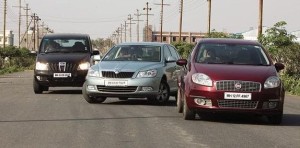Dr. Pete Weiss: Don’t Make the Other Driver Brake
By Peter Weiss, MD // May 14, 2015
Don't take risks on the road, or with your health

ORLANDO, FLORIDA — I was in a hurry today to get to an early morning appointment. At the last stop sign on the way out of my neighborhood, my foot got ahead of my judgment, and I turned left in front of a pickup truck.
In my defense, he (or she) was coming out of a dead end street, where 99 times out of 100 I stop at that intersection, there is no one coming.
Unfortunately this was the 100th time. The good news is that he wasn’t traveling very fast, slowed down and didn’t even honk at me. Another crisis averted.
Nevertheless, I was embarrassed and sorry to have made that mistake. I should have looked longer and taken my time before pulling out.
One of my safe driving rules is “Never make the other driver brake.” Oh well, my bad. If only there was some way to say, “I’m sorry” to the person behind me.

Later in the day, driving on Interstate 4 in Orlando, many other drivers pulled in front of me abruptly, requiring me to tap the brake in order to avoid a rear end collision. I guess it was payback for my morning mistake, but it made me think about how they were unnecessarily putting themselves (and me) at risk.
Why do that? Why assume that the guy behind you will have perfect attention to the road, and a perfect response to your aggressive maneuver?
What if I had been momentarily distracted? No one is perfect.
Our national healthcare system and your personal doctor aren’t perfect either.
I’m sure you’ve read about medical errors killing 100,000 Americans a year, not to mention nosocomial infections and various procedural complications.
These are very serious problems in healthcare, and virtually all physicians and healthcare systems are working hard to reduce their frequency. Yet they will never go to zero. There will always be mistakes and unexpected bad outcomes.

So why place yourself at risk? Many individuals live lifestyles that result in poor health and a predictable need for healthcare interventions – often urgent or emergent ones.
Perhaps it’s overeating, obesity, inactivity and smoking that leads to coronary artery disease and a trip to the Emergency Room for chest pain at age 60.
No doubt the system will be ready with EKG monitoring, drugs, labs and cardiac catheterization and angioplasty if needed.
But what if it’s not ready? What if the lone cardiologist is tied up in another case? Or what if something simply goes wrong and the patient suffers a major complication or even dies?
What happens then is, the patient or the patient’s family wants answers. How could you let that happen? Why didn’t the system do better? And often they want to assign blame.
The usual method is by lawsuit. It’s the American way. Find a lawyer and make the case that medical error, negligence or other healthcare imperfection killed him. There may even be truth in that claim.
But isn’t there also truth in the assessment that overeating, obesity, inactivity and smoking killed him, that his chosen lifestyle did him in? Yes, I think so too.
Bad outcomes are not uncommon in healthcare, and providers are generally accepting of their role, even their obligation, to make the system better, to minimize harm, and maximize benefit. But healthcare will never be perfect.
How about you? Do you accept your role in staying safe, in creating more health and less healthcare? Are you living a healthy lifestyle, or are you planning to make the other drivers brake?
P.S. If you were leaving Spartan Drive in a dark Dodge Ram and a gray Prius pulled out in front of you this morning – I am sorry.
ABOUT THE AUTHOR

Dr. Peter Weiss is a physician, healthcare executive, author, speaker and health coach with a passion for helping others to health and wellness. His book on personal health, More Health, Less Care, has drawn excellent reviews, and his newest book, The Love Fight, was released in November 2014. Formerly CEO of Health First Health Plans, Dr. Weiss currently serves as Senior Vice President at Florida Hospital in Orlando, part of the Adventist Health System. You can find him on the web at Healthdiscipleship.com














